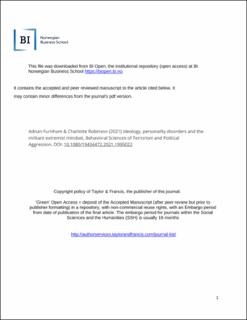Ideology, personality disorders and the militant extremist mindset
Journal article, Peer reviewed
Accepted version
Permanent lenke
https://hdl.handle.net/11250/3083867Utgivelsesdato
2021Metadata
Vis full innførselSamlinger
Originalversjon
Behavioral Sciences of Terrorism and Political Aggression. 2021, . 10.1080/19434472.2021.1995022Sammendrag
This study examined the relationship between demographic factors, intelligence, individual ideology (politics and religious beliefs), all the personality disorders (PDs) and the militant extremism mindset (MEM). Nearly 400 adults completed various self-report measures in addition to the three-dimensional MEM questionnaire which assessed Proviolence, Vile World and Divine Power Beliefs. They also completed a measure of the personality disorders (SCATI) which was used to calculate the three higher-order clusters. Correlations indicated similar correlates of Proviolence and Vile World views, but different for Divine Power beliefs. Political, but not religious, beliefs were strongly and differently associated with the first two factors. The PDs were nearly all associated with the Vile World factor but very little with the Divine Power factor. Hierarchical regressions indicated that relatively few PDs were associated with the three Mindset beliefs. When the PDs were grouped into higher order Clusters, Cluster A and B, as well as personal political beliefs were most closely associated with the Proviolence and Vile World views. Implications and limitations are discussed, as well as suggestions for future research.
